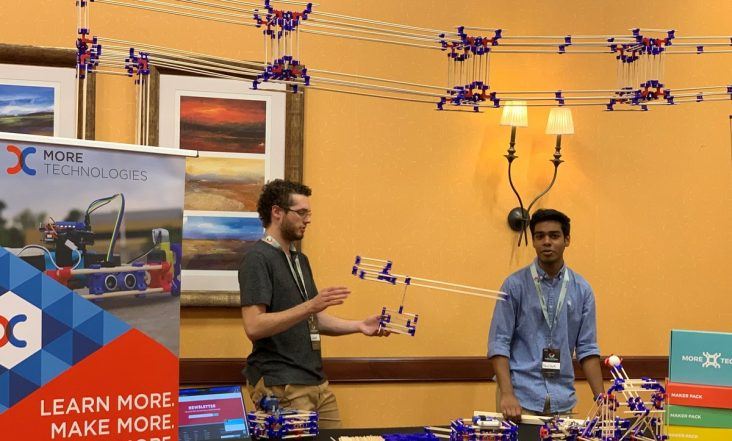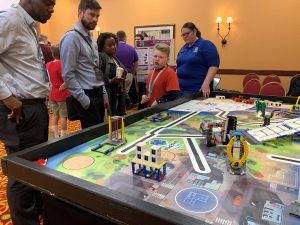NWA Tech Summit explores ‘what’s next, beyond next’
by October 21, 2019 7:22 pm 909 views

Local high school students demonstrate their arial robotics system as part of the tinkering lab at the NWA Technology Summit on Monday in Rogers.
High winds and severe weather overnight did not dampen the spirit of the first full day Monday (Oct. 21) of the Northwest Arkansas Technology Summit. Opening ceremonies and other events were held at John Q. Hammons Center in Rogers.
Attendance at Monday’s day-long event was impacted. But despite broken glass, downed trees and power outages at the convention center and Northwest Arkansas Regional Airport (XNA), which kept dozens from reaching the event, only one keynote speech was canceled.
It is the sixth year for the event, which was expanded this year. More than 2.000 people registered for the summit, but there were lots of empty seats at Monday’s sessions. The Greater Bentonville Area Chamber of Commerce, the organizing body of the summit, said having events spread over four days and 15 venues is something new. There are 60 speakers on the four-day agenda. Bill Groves, chief data officer from Walmart Inc., was to provide the late morning keynote, but he was detained in Dallas on Sunday night and could not make it to Northwest Arkansas in time for the event. A few of the vendor booths were also empty as they likely also could not make a connection to the region.
XNA was without power until nearly noon on Monday and roads and airport runways were also littered with downed trees and debris. Around noon, XNA officials said all flights would be delayed for several more hours.
The theme of this year’s event is “what’s next, after next.” Google executive Jared Skinner shared some of the forward-thinking ideology necessary to innovate for the future. In his morning keynote, Skinner said one of the founding principles is Google thinks 10X, not 10%. He explained 10X is about coming up with radical solutions to huge problems with breakthrough technology.
He said Google takes moon shots and the company celebrates its failures because of the learnings along the way. Skinner said when Google disabled GooglePlus the world might have been thinking it was a failure to Facebook.
“At Google, we used that failure to launch Google Photos which is now the largest photo management system on the planet,” Skinner said.
He said Project Loon at Google is the result of 10X thinking and celebrating failures. Skinner said pondering the big need for internet connectivity across the world in remote locations. Then someone said why not just use balloons that can float over areas to provide connectivity down below.
Google went to work on this moon shot of an idea and Project Loon was born. Google designed a connectivity balloon and can deploy them around the world to provide internet. The balloons can float in a stationary pattern because Google integrates weather and wind patterns.
Skinner lives in Houston, and said Hurricane Harvey two years ago was a catastrophic event and Google’s Project Loon was able to help. He said as badly as Houston was impacted, the hit on Puerto Rico was far worse. He said Google was able to deploy Project Loon balloons over Puerto Rico to provide connectivity during the clean-up of all the downed infrastructure.
“In Project Loon, Google went through thousands of iterations until the company found one that worked,” Skinner said.
Google said disruptors are necessary for a company’s ability to innovate. Stephen Fluin, also of Google, said in his morning breakout session the company has a high degree of internal trust and a low degree of external trust. He said when hiring for tomorrow’s needs a company must look for people who can manage themselves and day-to-day be their own bosses.
Fluin said everyone, no matter the field, will be involved in software development within 10 years as the world becomes more connected.
Dan Sanker, the founder of Fayetteville firm CaseStack, was awarded the “2019 Innovator of the Year” award at the conference on Monday. Sanker, who said he relocated to the region 13 years ago, is amazed at how the local technology ecosystem is evolving. He said events like the NWA Tech Summit and the investments from anchor companies and startups in the region are key to the ongoing growth.
“This award should be shared with the 350 people at CaseStack, who have worked with me over the past 20 years to innovate for our customer’s solutions that drive more profits to the bottom line,” Sanker said.

Sujata Gosalia, chief strategy officer at Cox Communications, also shared some insights about Cox’s focus on the future during the lunch session on Monday. Gosalia said Cox is working in the healthcare arena in an effort to innovate solutions that help to deliver better outcomes at lower costs. She said enabling the home to become a center for healthcare at one of the lowest price points. Technologies like monitoring patient wellbeing, checking in through telehealth possibilities or just getting reminders to take the prescribed medications at the right times, are areas where Cox might help.
She said farmers in rural areas also are looking for lower-cost options for ways to track their livestock and manage their farms and agricultural interests. Cox is working on this as well. Gosalia said smart cities are very much as the center of discussions at Cox. She said whether it is a two-block traffic pattern management system or connecting multiple cities’ transportation systems, Cox is working in these areas.
When asked about the “what’s next mindset” at top leadership roles such as hers, Gosalia said, “It is important to take time to look up and around you. You have to give yourself the oxygen for that kind of thinking about what comes next.
“Make sure you look at every interaction you have and then ask yourself what that teaches me, hire smart people who question the status quo and then be smart enough to shut up and listen to them.”
The afternoon keynote session featured a conversation with venture capital entrepreneur Arlan Hamilton, founder of Backstage Capital. When asked how the region might work to bring more people together to support the growing startup community, Hamilton said it’s important to invite media (content creators) and competitors into the fold.
Hamilton said in growing her own businesses, she has never accepted “no” as advice and she seeks out other mentors who share her passion because there is always something to learn. Hamilton, 39, got a taste of entrepreneurship in the third grade after seeing bulk candy in a local wholesale club. She convinced her mom to buy a package and then she resold it at school, undercutting the prices at the local 7-11 store.
“I was making sometimes $17 a week and I learned the free enterprise system early,” she said.
At 16, Hamilton came out as gay. In 2015, she founded Backstage Capital, a fund that supports women, people of color and members of the LGBTQ community. In less than three years, Backstage has invested in more than 100 founders. She stepped down as CEO in March, but in June, Hamilton was named by Business Insider as one of the most powerful LGBTQ+ people in technology.
On Tuesday (Oct. 22) there are multiple sessions across Bentonville that will explore topics in the supply chain, gaming theory, hemp investments, smart communities, animation for tomorrow, blockchain applications, IoT and the connected store and robotics.
The summit will wrap up on Wednesday with two specific events — angular architecture and celebrating inclusive innovation.
